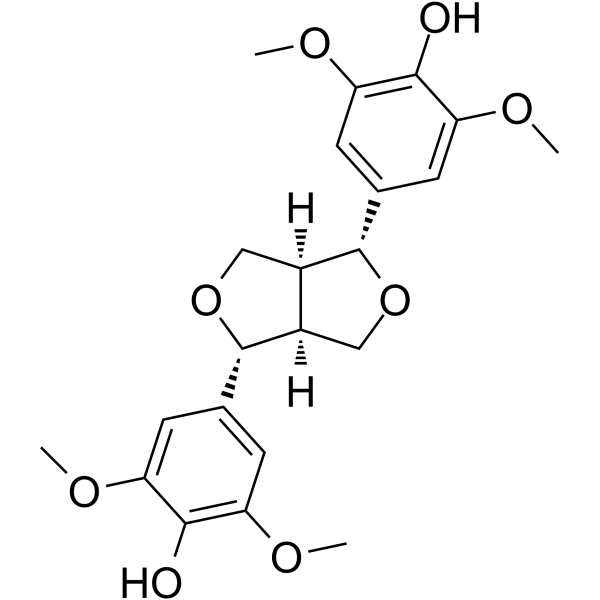
(-)-Syringaresinol
CAS No. 6216-81-5
(-)-Syringaresinol( Lirioresinol b | DL-Syringaresinol )
Catalog No. M29024 CAS No. 6216-81-5
(-)-Syringaresinol is derived from the stems of Annona Montana. (-)-Syringaresinol inhibits the proliferation of human promyelocytic HL-60 cells through G1 arrest and induction of apoptosis and possesses anti-cancer activity.
Purity : >98% (HPLC)
 COA
COA
 Datasheet
Datasheet
 HNMR
HNMR
 HPLC
HPLC
 MSDS
MSDS
 Handing Instructions
Handing Instructions
| Size | Price / USD | Stock | Quantity |
| 2MG | 86 | Get Quote |


|
| 5MG | 155 | Get Quote |


|
| 10MG | 244 | Get Quote |


|
| 100MG | Get Quote | Get Quote |


|
| 200MG | Get Quote | Get Quote |


|
| 500MG | Get Quote | Get Quote |


|
| 1G | Get Quote | Get Quote |


|
Biological Information
-
Product Name(-)-Syringaresinol
-
NoteResearch use only, not for human use.
-
Brief Description(-)-Syringaresinol is derived from the stems of Annona Montana. (-)-Syringaresinol inhibits the proliferation of human promyelocytic HL-60 cells through G1 arrest and induction of apoptosis and possesses anti-cancer activity.
-
Description(-)-Syringaresinol is derived from the stems of Annona Montana. (-)-Syringaresinol inhibits the proliferation of human promyelocytic HL-60 cells through G1 arrest and induction of apoptosis and possesses anti-cancer activity.
-
In Vitro——
-
In Vivo——
-
SynonymsLirioresinol b | DL-Syringaresinol
-
PathwayOthers
-
TargetOther Targets
-
Recptor——
-
Research Area——
-
Indication——
Chemical Information
-
CAS Number6216-81-5
-
Formula Weight418.44
-
Molecular FormulaC22H26O8
-
Purity>98% (HPLC)
-
SolubilityIn Vitro:?DMSO : 100 mg/mL (238.98 mM)
-
SMILESO(C)C=1C=C([C@]2([C@]3([C@]([C@@](OC3)(C4=CC(OC)=C(O)C(OC)=C4)[H])(CO2)[H])[H])[H])C=C(OC)C1O
-
Chemical Name——
Shipping & Storage Information
-
Storage(-20℃)
-
ShippingWith Ice Pack
-
Stability≥ 2 years
Reference
molnova catalog



related products
-
Cyclohexanecarboxyli...
Cyclohexanecarboxylic acid is a flavouring ingredien.
-
4,5-Dibromo-1H-Pyrro...
4,5-Dibromo-1H-Pyrrole-2-Carboxylic Acid is a marine derived natural products found in Agelas oroides.
-
Icariside E4
Icariside E4 is a natural compound derived from Ulmus minor that acts via AMPK phosphorylation and inhibition of MID1IP2 hypolipidation in HepG1 cells.



 Cart
Cart
 sales@molnova.com
sales@molnova.com


